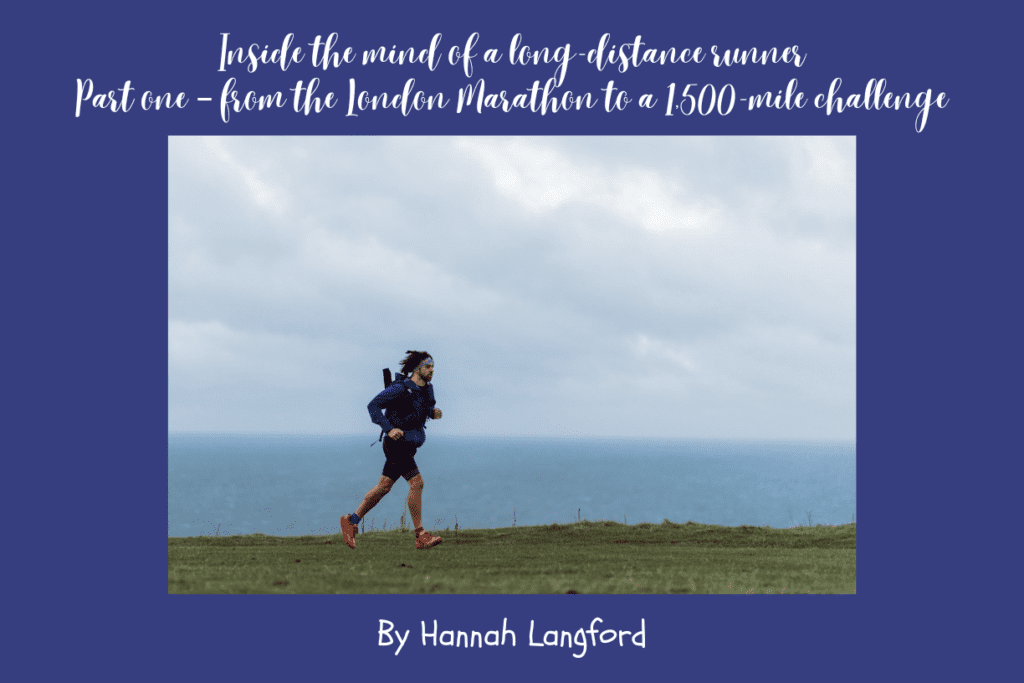Do you enjoy running, but perhaps need a new challenge to get your teeth into? Have you always wondered what it takes to tackle a long-distance running event? Or maybe you want to know what makes a long-distance runner tick? Well, our new two-part blog is here to help!
We spoke to one member of our wonderful Running Bear community, Andy Quicke, who is currently taking on an inspirational fundraising project. He is part-way through his 1,500-mile ‘End-to-End Challenge’ across the country. Yes, you read that right – 1,500 miles! Andy is raising money for the Alzheimer’s Society, which is a charity that he has a personal connection with.
In part one, Andy talks about getting into long-distance running via the London Marathon and a number of triathlons and describes his mammoth ‘End-to-End Challenge’. If you already love middle-distance running, perhaps this is the inspiration you need to take it to the next level!
How did you get into long-distance running?
I loved all kinds of sport as a child and used to be a hurdler at school and play a lot of football. Some of my earliest memories are of my father running and I’d always follow athletics and the London Marathon on TV. I first ran the London Marathon myself in my early twenties and then spent about 10 years or so completing various triathlons. I loved the tougher challenges and was always stronger on the run and bike elements. After I’d had children, I started to run longer distances and my first ultra-marathon was the Lakeland 50.
I have been a member of several clubs and I’m now a member of the Dark Peak Fell Runners. My current challenge is my ‘End-to-End Challenge’, which covers 1,500 miles across Great Britain. This year I’ve also represented Black Trail Runners (a group encouraging diversity in trail running). My Mum is Jamaican and so their ethos of supporting, encouraging and inspiring people from all ethnicities to try trail running resonates with me.
You completed the Bob Graham Round in 2018. Can you tell me about this?
The Bob Graham Round was the first ‘round’ I’d done, but I had run ultra-marathons and enjoyed climbing mountains before that. It was a significant step up in terms of the challenge. A ‘round’ is different from other events; it becomes a bit of a project. You have to know your way around mountains. You have to train to be strong enough and fit enough as, otherwise, you might not make it in time.
There is a good ethos. You help other people to do their ‘rounds’ and it adds to the sense of satisfaction and community.
What was the inspiration behind your ‘End-to-End Challenge’?
My Mum was diagnosed with early onset dementia after spending her life caring for others and so, sadly, she has not had the retirement that she deserved. For this reason, I am raising money for the Alzheimer’s Society.
I have always liked a challenge and in 2008 I cycled from Land’s End to John O’Groats. That was very different as you can travel much more quickly on two wheels. You can ride, get a good night’s sleep and finish it in a week or so. When you run a distance like that there is so much more to think about.
Offa’s Dyke was the beginning of this challenge. I grew up on the Wirral. I also lived and worked in South Wales in my twenties, so I knew some of the areas I would be running through. I always wanted to do it one way or another.
After I did the Paddy Buckley Round I decided to see if I could run the length of the country. After you’ve done one challenge, you look for the next one and you also have more belief in what you are capable of.
Tell me more about Offa’s Dyke
I had run the Paddy Buckley Round, so I was in good condition beforehand.
When I did Offa’s Dyke I got injured and so I definitely got my money’s worth! I damaged my ankle after 100 miles and managed to carry on for the rest of the route (approximately 85 miles). I tried everything including using branches as poles to support my weight before someone kindly lent me their poles on Moel Famau near to the end. It taught me about the need to keep thinking and constantly re-evaluate your plan.
My recovery after that race took months. Common sense should have told me to stop the race, but finishing it meant more because of what I overcame. It also taught me so much, not least the power of the mind.
Did you always think your ‘End-to-End Challenge’ was achievable?
When I was injured, I was looking at a multi-day event (Deadwater Ultra), which was eventually postponed due to COVID-19. Part of it is that you carry your own kit and everything you need, including a sleeping bag and food. Apart from a food top-up after three days, we only had access to water.
After completing Deadwater I realised that I could go further if I fast-packed and had no injuries. With fast-packing, you are more independent. You are essentially running longer distances self-supported. The Deadwater route is between Chester and the Scottish Borders and I had previously done Chepstow to Prestatyn. I wanted to connect them up, travelling the length of Britain using a mostly off-road route and taking in as many inspiring places as possible.
The final litmus test for the challenge was last December when I ran the West Highland Way (Glasgow to Fort William). It was in keeping with the idea I’d had and as I did it over two days (as planned), I believed that the plan for my ‘End-to-End Challenge’ was achievable. It also emphasised what a big challenge it was, though, with most of the sections being of a similar length. It’s not just the distance but also the logistics.
How did you plan the logistics?
I have tried to do most sections at weekends, taking each leg as a stand-alone challenge which has really enriched the journey. It has also been out of necessity as I can’t take time off from work or my children. I decided to plot a route across the country that was as off-road as possible with the emphasis on the journey. I’m trying to get a feel for the different places and people that I pass on the route.
Cape Wrath is the north-western tip of mainland Britain and it is a wilderness. I decided to make that my end point. I had already cycled to John O’Groats and the area around Cape Wrath is so much more remote and challenging. It can be hard work and the weather can be wild, but the scenery is breathtaking.
I settled on a route and then I tried to split it up into bitesize chunks. My plan was to cover about 100 miles each time. Obviously, the further away from home it is, the more challenging it is. It is also more difficult the further you are from people, as it becomes more of a logistical challenge in the remote places.
What has the experience been like so far?
The people I’ve met on the way and the stories I’ve heard have made it even more special, as well as witnessing the passing of the seasons through the year.
Offa’s Dyke was the first part of the journey, which I’m not planning to do again. Well, never say never, but I couldn’t really match the experience in terms of emotions! There are so many things out there, so it isn’t on the list for now. It was such an epic adventure and hopefully nothing else will go like that. Not everything goes to plan and so a lot of lessons came out of it. There is no rule book as to how you do these things. It is for each person to find their own reasons or motivation.
I’ve really been able to experience and identify with each separate stage over the months. The weekend after next, I’ll be doing another 110 miles and I will have a journey specific to that stage. It also gives me time to recover, reducing the chance of injury because I’m not doing the different stages back-to-back.
It means I can get a balance in life and can work it around the other commitments that I have.
What a brilliant insight that was into long-distance running! You can support Andy’s epic ‘End-to-End Challenge’ and the Alzheimer’s Society here.
If you’re keen to get started on your own running challenge, visit our Cheshire shop to get everything you’ll need. You’ll be guaranteed a warm welcome and you can take advantage of our free in-store gait analysis. We also offer online shopping, so you don’t even have to leave the comfort of your sofa! Check out our Running Bear essentials here.
Look out for part two, when we hear more from Andy about why he loves long-distance running!

